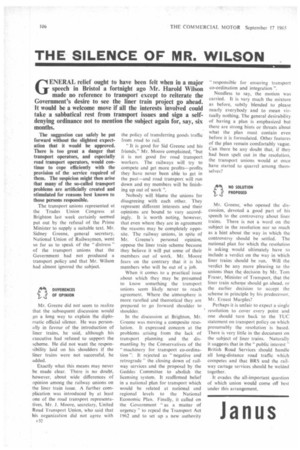THE SILENCE OF MR. WILSON
Page 106

If you've noticed an error in this article please click here to report it so we can fix it.
GENERAL relief ought to have been felt when in a major speech in Bristol a fortnight ago Mr. Harold Wilson made no reference to transport except to reiterate the Government's desire to see the liner train project go ahead. It would be a welcome move if all the interests involved could take a sabbatical rest from transport issues and sign a selfdenying ordinance not to mention the subject again for, say, six months.
The suggestion can safely be put forward without the slightest expectation that it would be approved. There is too great a danger that transport operators, and especially road transport operators, would continue to cope efficiently with the provision of the service required of them. The suspicion might then arise that many of the so-called transport problems are artificially created and stimulated for reasons best known to those persons responsible.
The transport unions represented at the Trades Union Congress at Brighton last week certainly seemed put out by the refusal of the Prime Minister to supply a suitable text. Mr. Sidney Greene, general secretary, National Union of Railwaymen, went so far as to speak of the "distress" of the transport unions that the Government had not produced a transport policy and that Mr. Wilson had almost ignored the subject.
DIFFERENCES OF OPINION
Mr. Greene did not seem to realize that the subsequent discussion would go a long way to explain the diplomatic official silence. He was personally in favour of the introduction of liner trains, he said, although his executive had refused to support the scheme. He did not want the responsibility laid on his shoulders if the liner trains were not successful, he added.
Exactly what this means may never be made clear_ There is no doubt, however, about wide differences of opinion among the railway unions on the liner train issue. A further complication was introduced by at least one of the road transport representatives, Mr. J. Moore, secretary, United Road Transport Union, who said that his organization did not agree with F32 the policy of transferring goods traffic from road to rail.
"It is good for Sid Greene and his friends," Mr. Moore complained, "but it is not good for road transport workers. The railways will try to compete and get more profits—profits they have never been able to get in the past—and road transport will run down and my members will be finishing up out of work ".
Nobody will blame the unions for disagreeing with each other. They represent different interests and their opinions are bound to vary accordingly. It is worth noting, however, that even where they are in agreement the reasons may be completely opposite. The railway unions, in spite of Mr. Greene's personal opinion, oppose the liner train scheme because they believe it will put some of their members out of work. Mr_ Moore fears on the contrary that it is his members who will be out of a job.
When it comes to a practical issue about which they may be presumed to know something the transport unions seem likely never to reach agreement. Where the atmosphere is more rarefied and theoretical they are prepared to go forward shoulder to shoulder.
In the discussion at Brighton, Mr. Greene was moving a composite resolution. It expressed concern at the problems arising from the lack of transport planning and the dismantling by the Conservatives of the machinery for transport co-ordination ". It rejected as " negative and retrograde the closing down of railway services and the proposal by the Geddes Committee to abolish the licensing system. It reaffirmed belief in a national plan for transport which would be related at national and regional levels to the National Economic Plan. Finally, it called on the Government "as a matter of urgency " to repeal the Transport Act 1962 and to set up a new authority " responsible for ensuring transport co-ordination and integration ".
Needless to say, the motion was carried. It is very much the mixture as before, subtly blended to please nearly everybody and to mean virtually nothing. The general desirability of having a plan is emphasized but there are strong hints or threats about what the plan must contain even before it is formulated. Other features of the plan remain comfortably vague. Can there be any doubt that, if they had been spelt out in the resolution, the transport unions would at once have started to quarrel among themselves?
NO SOLUTION PROPOSED
Mr. Greene, who opened the discussion, devoted a good part of his speech to the controversy about liner trains. There is not a word on the subject in the resolution nor so much as a hint about the way in which the controversy should be settled. The national plan for which the resolution is asking would ultimately have to include a verdict on the way in which liner trains should be run. Will the verdict be any more pleasing to the unions than the decision by Mr. Toni Fraser, Minister of Transport, that the liner train scheme should go ahead, or the earlier decision to accept the scheme in principle by his predecessor. Mr. Ernest Marples?
Perhaps it is unfair to expect a single ' resolution to cover every point and one should turn back to the TUC statement on transport policy on which presumably the resolution is based. There is very little in the document on the subject of liner trains. Naturally it suggests that in the "public interest " British Road Services should handle all long-distance road traffic which competes and that BRS and the railway cartage services should be welded together.
It evades the all-important question of which union would come off best under this arrangement.
Janus




















































































































































































